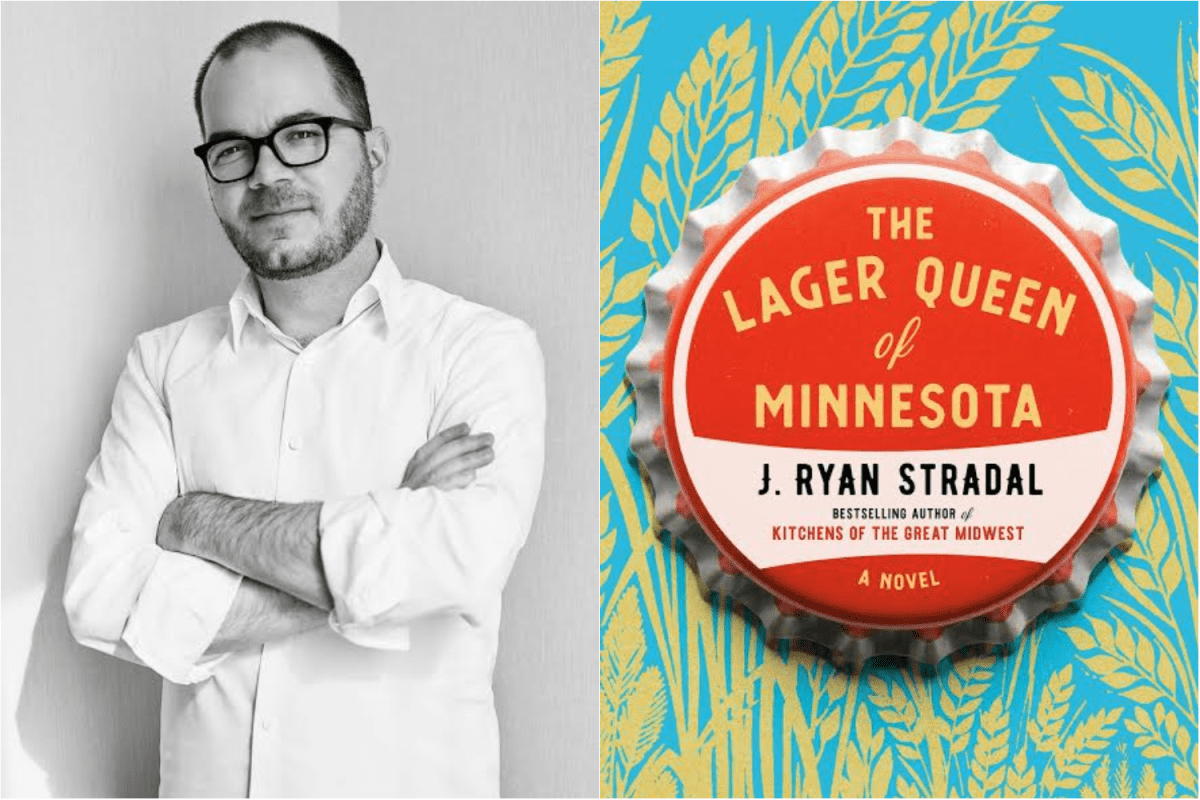J. Ryan Stradal is really nice and polite when he answers the phone. Considering he wrote a bestselling debut novel titled Kitchens of the Great Midwest and has followed it up with the hilarious and heartwarming The Lager Queen of Minnesota, it should come as little surprise that the author hails from the middle of the country, where people are considered, well, nice and polite.
Stradal has made a name for himself chronicling the lives, loves and obsessions of Midwesterners. Where his first book focused on the food culture of his native Minnesota, his second novel looks at the most beloved drink of the prairie: beer. Stradal lays out the story of two sisters who went down two very different paths: Helen, whose obsession with beer leads her to make it and become very wealthy off of it, and Edith, who doesn’t have as much financial success as her sibling, but bakes some of the best pie in the state.
Since the book has such a heavy beer focus, I decide I am sort of curious what the writer’s first experience with brew was. People all over the globe drink beer, but for Midwesterners, it’s sort of a point of pride, something they really care about. Or, at least, it was until big corporations took everything over, making a beer’s birthplace simply part of the marketing strategy. Still, Stradal is old enough to recall that sort of regionality, and it shows in his book. It used to be if you’re from Detroit, there’s a good chance you or somebody you knew swore allegiance to Stroh’s; Chicagoans had their Old Style; Schlitz is what made Milwaukee famous, but people from Wisconsin will also tell you they were drinking PBR long before it came the cool inexpensive beer.
“It was a Miller Light and I hated it,” Stradal says. “I was 15, don’t tell my dad,” he follows up with a laugh. It’s the sort of good-natured non-joke that you might expect from one of his characters.
When writing about people from his native state, Stradal, who now resides in L.A., hardly pulls any of the stereotypes associated with people from so-called “fly-over states” that lesser writers might rely upon. Instead, much like his first book, he presents a number of smart, fleshed-out characters, but makes sure the story he tells, whether it involves food or beer, is told right. Take the setting the characters find themselves in. He doesn’t have them reinventing an industry or discovering “craft” brewing or anything like that. Stradal understands the history of making beer and tries to be as true to that as possible.
“They opened a brewery during the most difficult time to open a brewery in our country’s history, aside from prohibition. And I thought, OK, what was their angle. So I have them get into the light beer thing early, that was the angle. That’s the only way a brewery that opened in the late -’60s, early-’70s could possibly survive, is if they got a piece of that market.
His books have all the heart and good story you could want, but it’s how he nails other little tidbits, like giving a minor character who tried out but failed to make the Minnesota Vikings a name like Rud Herzog. It sounds so simple, but Herzog, who becomes the pitchman for her Blotz Special Light beer, is such a perfect emblem not just of the kind of macho face companies used to sell their products in the 1970s, but as the kind of guy you’d picture hailing from Minnesota.
“It’s very Minnesotan and I think perhaps Midwestern in general, the self-deprecating humor, the kind of playing down whatever kind of success you had, and saying, ‘Well, I didn’t make it, but this is what I’m going to do.’ That kind of stuff. It seemed very likely that a character like that had a chance to succeed as a pitch man.”
And while plot and character building are of the utmost importance to any writer, Stradal did write a book about beer, and the amount of help he relied on from the people that make it shows throughout the book.
“I did a lot of research on light beer. And I didn’t know going into the book that light beer is one of the more difficult varieties of beer to make. So I thought, okay, now I need to make this person qualified and capable of making light beer.” The answer almost every brewer told him was to make Helen a chemistry major. “People go to college and get chemistry degrees now with the intent of becoming brewers,” he points out.
So now that he’s written one great book about cooks in the middle of the country and another about a beer brewer in the same region, which job could Stradal see himself doing if he had to pick one as a new career?
“As a writer I think I’ve become kind of attached to a monotonous process or at the very least having a homogeneity day to day. And brewing definitely offers that, from what I’ve seen,” he says. “Being a chef is far more dynamic. I mean, it’d be exciting, don’t get me wrong, but I think it would stress me out.
It’s a solid enough answer, I think. I’m satisfied and I’m about to ask him another, but he politely interrupts to add a little more.
“Oh, I’m sorry,” he starts off. “From what I’ve seen, being a brew master is more of a solitary job quite often, or maybe with one other person. Being a chef is really being part of a machine. It’s much more social. And as a writer I’m more of an introvert and much, much happier working alone or working with like one other person, an editor, than as part of a dynamic squad. So there’s also that aspect.”
Thankfully, with The Lager Queen of Minnesota serving as a perfect follow-up to his smash debut, Stradal probably won’t have to give much thought to a career change anytime soon.
Every Thursday, our resident experts see to it that you’re up to date on the latest from the world of drinks. Trend reports, bottle reviews, cocktail recipes and more. Sign up for THE SPILL now.

























